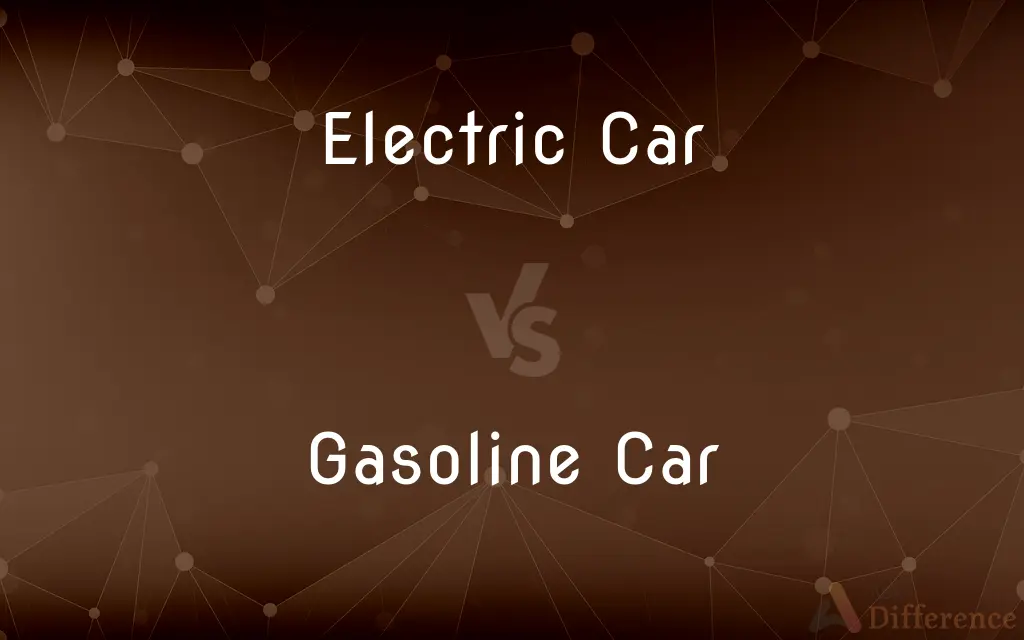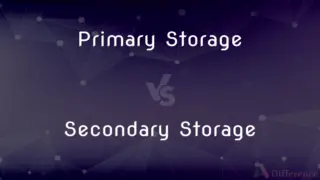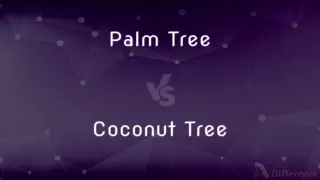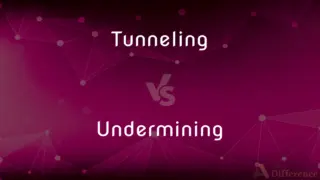Electric Car vs. Gasoline Car — What's the Difference?
By Tayyaba Rehman — Published on September 25, 2023
An electric car operates on electric power from batteries or fuel cells, while a gasoline car uses internal combustion engines fueled by gasoline.

Difference Between Electric Car and Gasoline Car
Table of Contents
ADVERTISEMENT
Key Differences
Electric cars rely on electricity stored in batteries or produced by fuel cells, ensuring they emit no tailpipe pollutants. In contrast, gasoline cars burn gasoline in an internal combustion engine, releasing emissions.
Charging stations power electric cars, and they have become increasingly common in urban areas. On the other hand, gasoline cars need regular refueling at gas stations, which are widespread.
Electric cars generally have fewer moving parts than gasoline cars, leading to potentially less maintenance. However, battery replacement is a consideration for electric vehicles.
The driving range of electric cars has been a concern in the past, though advancements in battery technology are improving this. Gasoline cars, typically, have longer driving ranges between refuels.
Noise levels are another difference: electric cars are notably quieter, especially at low speeds. In comparison, gasoline cars produce more noise due to the combustion process and mechanical operations.
ADVERTISEMENT
Comparison Chart
Power Source
Electricity from batteries or fuel cells.
Combustion of gasoline.
Emissions
Zero tailpipe emissions.
Emissions including CO2, NOx, and other pollutants.
Maintenance Requirements
Generally lower due to fewer moving parts.
Regular maintenance needed for engine and components.
Refueling/Recharging Infrastructure
Charging stations.
Gas stations.
Noise Levels
Quieter, especially at low speeds.
Noisier due to combustion and mechanics.
Compare with Definitions
Electric Car
An automobile that derives its power from electric sources.
Many cities offer incentives to promote electric car usage.
Gasoline Car
A vehicle with an engine that burns gasoline to create power.
As gas prices rise, the operating cost of a gasoline car can increase.
Electric Car
A car that operates on electricity, eliminating tailpipe emissions.
Charging stations for electric cars are increasing in number.
Gasoline Car
A vehicle that uses gasoline to power its internal combustion engine.
The gasoline car has been the dominant mode of transport for over a century.
Electric Car
A vehicle powered by electric motors using energy stored in batteries.
The popularity of the electric car has surged due to environmental concerns.
Gasoline Car
An automobile operating on gasoline fuel through combustion.
Emissions from gasoline cars contribute to environmental pollution.
Electric Car
A vehicle using electric energy instead of gasoline or diesel.
She switched to an electric car to reduce her carbon footprint.
Gasoline Car
An automotive using gasoline as its primary source of energy.
Environmentalists encourage transitioning from gasoline cars to cleaner alternatives.
Electric Car
An automotive that relies on electric power for propulsion.
With advancements in technology, the electric car's range has improved considerably.
Gasoline Car
A car that requires gasoline for its engine to produce motion.
Despite electric vehicle trends, the gasoline car remains popular worldwide.
Common Curiosities
How long do electric car batteries last?
Electric car batteries typically last 8-15 years, depending on usage and maintenance, unlike gasoline cars which need frequent oil changes.
Are electric cars more environmentally friendly?
Electric cars have zero tailpipe emissions, making them cleaner than gasoline cars, though electricity source matters.
Can electric cars function in cold climates?
Yes, but range might be reduced in very cold temperatures for electric cars. Gasoline cars also face cold start issues.
Do electric cars offer tax incentives?
Many regions offer tax incentives for electric cars, whereas gasoline cars typically don't receive such benefits.
How widespread are charging stations?
Charging stations for electric cars are growing in number, especially in cities, while gasoline cars have established refueling networks.
Are electric cars silent?
Electric cars are generally quieter than gasoline cars, especially at lower speeds.
Are electric cars more expensive?
Initially, electric cars can be pricier than gasoline cars, but they may offer savings in fuel and maintenance over time.
How often do electric cars need charging?
It varies, but most electric cars need charging every 100-300 miles, unlike gasoline cars which refuel less frequently.
Can gasoline cars be converted to electric?
Yes, some gasoline cars can be converted to electric cars, though it may be complex and costly.
Do electric cars have fewer moving parts?
Electric cars typically have fewer moving parts than gasoline cars, which can mean less maintenance.
How long does it take to charge an electric car?
Charging times for electric cars vary, ranging from 30 minutes (fast charge) to 12 hours, unlike the quick refuel of gasoline cars.
Are electric cars safe?
Electric cars undergo the same safety tests as gasoline cars and are built to meet safety standards.
How does acceleration compare between the two?
Many electric cars offer quicker acceleration than traditional gasoline cars due to instant torque.
How do electric car ranges compare to gasoline cars?
While gasoline cars generally have longer ranges, electric car ranges are improving with advancements in battery technology.
How does resale value compare?
Resale values for electric cars used to be lower, but as demand grows, they're becoming comparable to gasoline cars.
Share Your Discovery

Previous Comparison
Inductive Reasoning vs. Abductive Reasoning
Next Comparison
Neoclassicism vs. RomanticismAuthor Spotlight
Written by
Tayyaba RehmanTayyaba Rehman is a distinguished writer, currently serving as a primary contributor to askdifference.com. As a researcher in semantics and etymology, Tayyaba's passion for the complexity of languages and their distinctions has found a perfect home on the platform. Tayyaba delves into the intricacies of language, distinguishing between commonly confused words and phrases, thereby providing clarity for readers worldwide.















































